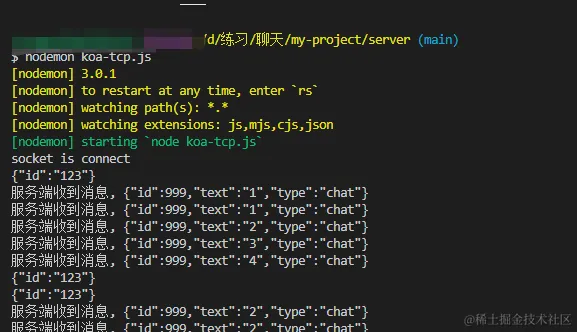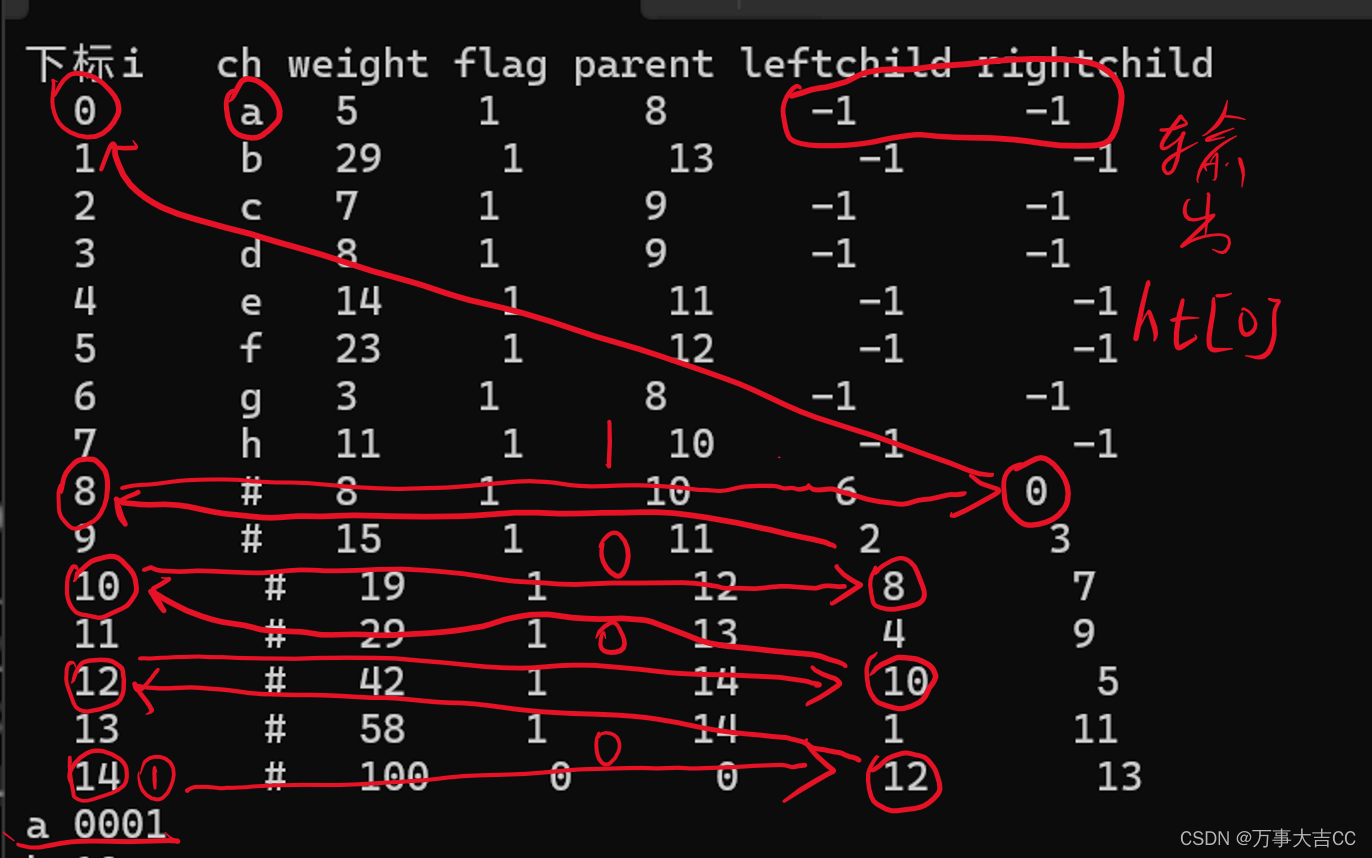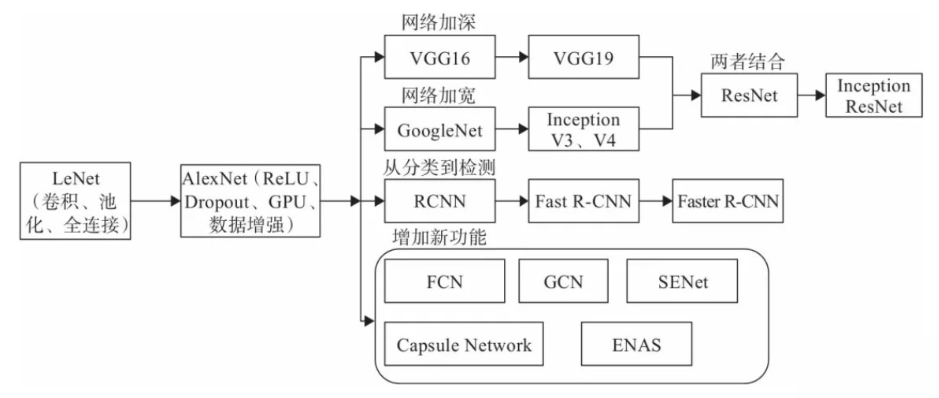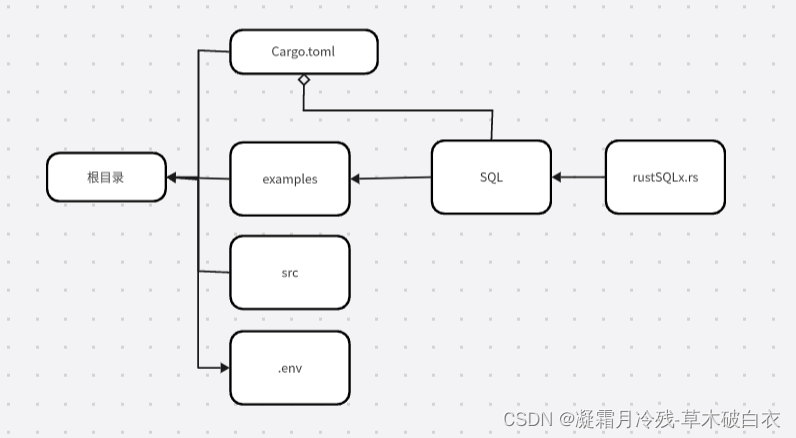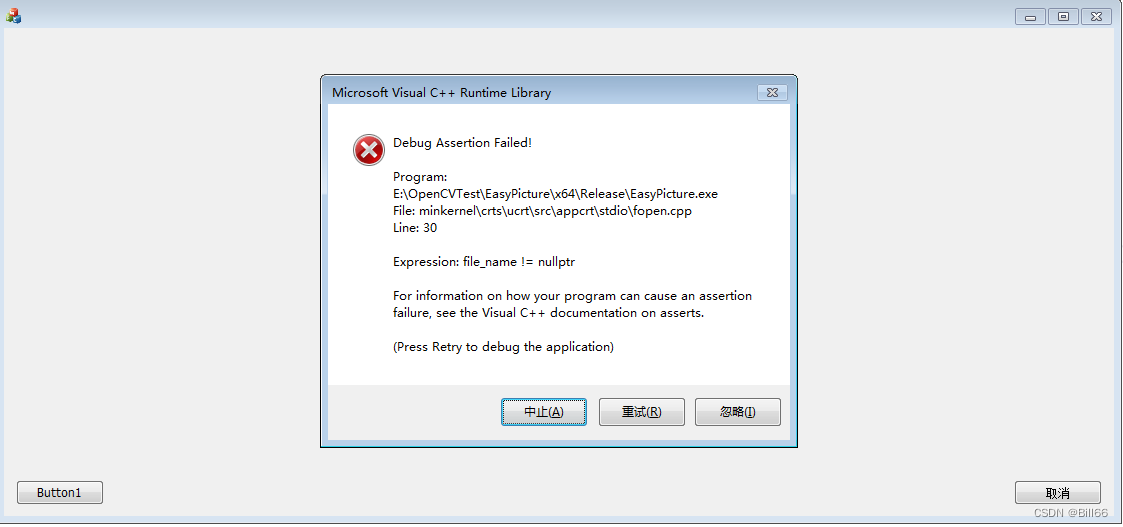文章接着上回Linux migrate_type初步探索
1、物理页面添加到buddy系统
我们都知道物理内存一开始是由memblock进行分配管理,后面会切换到buddy系统管理。那么接下来我们看一下,memblock管理的物理页面是怎么添加到buddy系统中的。
start_kernel()
-> mm_init()
--> mem_init()
---> memblock_free_all()
----> free_low_memory_core_early()
1.1 free_low_memory_core_early()
static unsigned long __init free_low_memory_core_early(void)
{
unsigned long count = 0;
phys_addr_t start, end;
u64 i;
memblock_clear_hotplug(0, -1);
// 处理预留内存
for_each_reserved_mem_range(i, &start, &end)
reserve_bootmem_region(start, end);
/*
* We need to use NUMA_NO_NODE instead of NODE_DATA(0)->node_id
* because in some case like Node0 doesn't have RAM installed
* low ram will be on Node1
*/
// 遍历可释放物理内存区域,进行释放
for_each_free_mem_range(i, NUMA_NO_NODE, MEMBLOCK_NONE, &start, &end,
NULL)
count += __free_memory_core(start, end);
return count;
}
static unsigned long __init __free_memory_core(phys_addr_t start,
phys_addr_t end)
{
unsigned long start_pfn = PFN_UP(start);
unsigned long end_pfn = min_t(unsigned long,
PFN_DOWN(end), max_low_pfn);
if (start_pfn >= end_pfn)
return 0;
// 进行页面释放处理
__free_pages_memory(start_pfn, end_pfn);
return end_pfn - start_pfn;
}
1.2 __free_pages_memory()
static void __init __free_pages_memory(unsigned long start, unsigned long end)
{
int order;
while (start < end) {
/**
* 由于buddy系统最大能存放的页面order是MAX_ORDER - 1UL,所以这里要进行限制
* __ffs()函数是用来根据start值计算出最合适的order值
* __ffs()函数作用是求第start第一个位为1的位置,例如:start = 0x63300,
* 说明该地址以0x100对齐,那么__ffs()返回值为8
*/
order = min(MAX_ORDER - 1UL, __ffs(start));
// 如果发现order太大,实际没有那么多物理内存,则不断减小order,直至能包含为止
while (start + (1UL << order) > end)
order--;
// 将页面释放到buddy系统
memblock_free_pages(pfn_to_page(start), start, order);
start += (1UL << order);
}
}
1.3 memblock_free_pages()
void __init memblock_free_pages(struct page *page, unsigned long pfn,
unsigned int order)
{
if (early_page_uninitialised(pfn))
return;
// 调用内部接口释放页面
__free_pages_core(page, order);
}
void __free_pages_core(struct page *page, unsigned int order)
{
unsigned int nr_pages = 1 << order;
struct page *p = page;
unsigned int loop;
/*
* When initializing the memmap, __init_single_page() sets the refcount
* of all pages to 1 ("allocated"/"not free"). We have to set the
* refcount of all involved pages to 0.
*/
prefetchw(p);
// 遍历当前order页面内所有page,并初始化
for (loop = 0; loop < (nr_pages - 1); loop++, p++) {
prefetchw(p + 1);
// 清楚页面预留标记
__ClearPageReserved(p);
// 设置页面引用计数为0
set_page_count(p, 0);
}
__ClearPageReserved(p);
set_page_count(p, 0);
atomic_long_add(nr_pages, &page_zone(page)->managed_pages);
/*
* Bypass PCP and place fresh pages right to the tail, primarily
* relevant for memory onlining.
*/
// 将页面释放到buddy系统中
__free_pages_ok(page, order, FPI_TO_TAIL);
}
static void __free_pages_ok(struct page *page, unsigned int order,
fpi_t fpi_flags)
{
unsigned long flags;
int migratetype;
unsigned long pfn = page_to_pfn(page);
if (!free_pages_prepare(page, order, true))
return;
// 获取页面所在页块的迁移类型
migratetype = get_pfnblock_migratetype(page, pfn);
local_irq_save(flags);
__count_vm_events(PGFREE, 1 << order);
// 将页面放置在对应迁移类型对应order的管理链表上
free_one_page(page_zone(page), page, pfn, order, migratetype,
fpi_flags);
local_irq_restore(flags);
}
这里就是物理内存从memblock转移到buddy系统的流程。
2、迁移类型fallback处理逻辑
接下来我们再来看看一个新问题:一开始页块的迁移类型都是MIGRATE_MOVABLE,那对于MIGRATE_UNMOVABLE迁移类型的内存分配应该怎么处理呢?
2.1 原理图
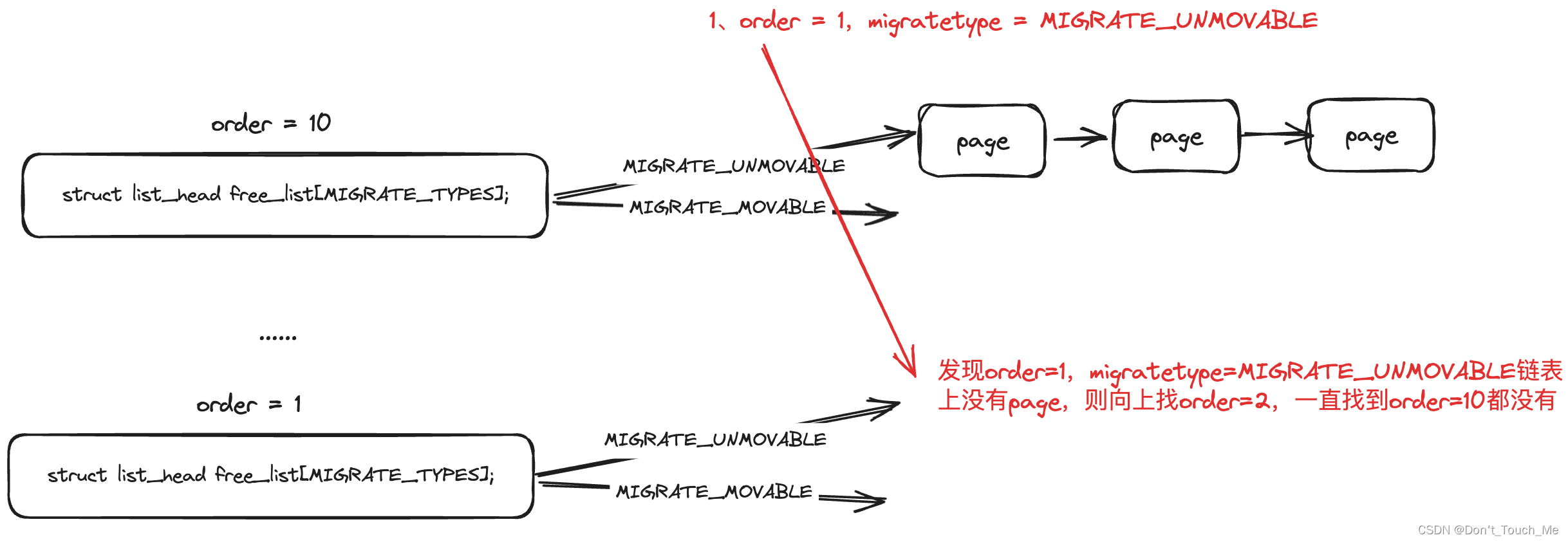

我们都知道Linux内核内存分配接口alloc_pages(),那么我们就跟踪这个接口,看看是如何分配出MIGRATE_UNMOVABLE迁移类型的内存。
alloc_pages()
-> alloc_pages_node()
--> __alloc_pages_node()
---> __alloc_pages()
----> __alloc_pages_nodemask()
我们接下来仔细研究一下__alloc_pages_nodemask()实现:
2.2 __alloc_pages_nodemask()
/*
* This is the 'heart' of the zoned buddy allocator.
*/
struct page *
__alloc_pages_nodemask(gfp_t gfp_mask, unsigned int order, int preferred_nid,
nodemask_t *nodemask)
{
struct page *page;
// 第一次分配时,我们会从zone的low水线以上分配内存
unsigned int alloc_flags = ALLOC_WMARK_LOW;
gfp_t alloc_mask; /* The gfp_t that was actually used for allocation */
struct alloc_context ac = { };
/*
* There are several places where we assume that the order value is sane
* so bail out early if the request is out of bound.
*/
// 如果order>=11时,buddy系统无法分配出内存,因此直接返回错误
if (unlikely(order >= MAX_ORDER)) {
WARN_ON_ONCE(!(gfp_mask & __GFP_NOWARN));
return NULL;
}
gfp_mask &= gfp_allowed_mask;
alloc_mask = gfp_mask;
// 这里是根据gfp设置分配标识,以及确定优先从哪个zone里进行内存分配
if (!prepare_alloc_pages(gfp_mask, order, preferred_nid, nodemask, &ac, &alloc_mask, &alloc_flags))
return NULL;
/*
* Forbid the first pass from falling back to types that fragment
* memory until all local zones are considered.
*/
alloc_flags |= alloc_flags_nofragment(ac.preferred_zoneref->zone, gfp_mask);
// 内存分配快速路径,我们今天只需要跟踪该函数实现就好了
/* First allocation attempt */
page = get_page_from_freelist(alloc_mask, order, alloc_flags, &ac);
if (likely(page))
goto out;
/*
* Apply scoped allocation constraints. This is mainly about GFP_NOFS
* resp. GFP_NOIO which has to be inherited for all allocation requests
* from a particular context which has been marked by
* memalloc_no{fs,io}_{save,restore}.
*/
alloc_mask = current_gfp_context(gfp_mask);
ac.spread_dirty_pages = false;
/*
* Restore the original nodemask if it was potentially replaced with
* &cpuset_current_mems_allowed to optimize the fast-path attempt.
*/
ac.nodemask = nodemask;
// 当快速路径无法分配出内存时,就会调用该函数,走慢速路径内存分配,这里会异步唤醒kswapd线程回收内存等操作
page = __alloc_pages_slowpath(alloc_mask, order, &ac);
out:
if (memcg_kmem_enabled() && (gfp_mask & __GFP_ACCOUNT) && page &&
unlikely(__memcg_kmem_charge_page(page, gfp_mask, order) != 0)) {
__free_pages(page, order);
page = NULL;
}
trace_mm_page_alloc(page, order, alloc_mask, ac.migratetype);
return page;
}
EXPORT_SYMBOL(__alloc_pages_nodemask);
2.3 get_page_from_freelist()
/*
* get_page_from_freelist goes through the zonelist trying to allocate
* a page.
*/
static struct page *
get_page_from_freelist(gfp_t gfp_mask, unsigned int order, int alloc_flags,
const struct alloc_context *ac)
{
struct zoneref *z;
struct zone *zone;
struct pglist_data *last_pgdat_dirty_limit = NULL;
bool no_fallback;
retry:
/*
* Scan zonelist, looking for a zone with enough free.
* See also __cpuset_node_allowed() comment in kernel/cpuset.c.
*/
no_fallback = alloc_flags & ALLOC_NOFRAGMENT;
z = ac->preferred_zoneref;
// 优先从最优先的zone分配内存,若未分配到,降级到其他可分配内存的zone
for_next_zone_zonelist_nodemask(zone, z, ac->highest_zoneidx,
ac->nodemask) {
struct page *page;
unsigned long mark;
if (cpusets_enabled() &&
(alloc_flags & ALLOC_CPUSET) &&
!__cpuset_zone_allowed(zone, gfp_mask))
continue;
/*
* When allocating a page cache page for writing, we
* want to get it from a node that is within its dirty
* limit, such that no single node holds more than its
* proportional share of globally allowed dirty pages.
* The dirty limits take into account the node's
* lowmem reserves and high watermark so that kswapd
* should be able to balance it without having to
* write pages from its LRU list.
*
* XXX: For now, allow allocations to potentially
* exceed the per-node dirty limit in the slowpath
* (spread_dirty_pages unset) before going into reclaim,
* which is important when on a NUMA setup the allowed
* nodes are together not big enough to reach the
* global limit. The proper fix for these situations
* will require awareness of nodes in the
* dirty-throttling and the flusher threads.
*/
if (ac->spread_dirty_pages) {
if (last_pgdat_dirty_limit == zone->zone_pgdat)
continue;
if (!node_dirty_ok(zone->zone_pgdat)) {
last_pgdat_dirty_limit = zone->zone_pgdat;
continue;
}
}
if (no_fallback && nr_online_nodes > 1 &&
zone != ac->preferred_zoneref->zone) {
int local_nid;
/*
* If moving to a remote node, retry but allow
* fragmenting fallbacks. Locality is more important
* than fragmentation avoidance.
*/
local_nid = zone_to_nid(ac->preferred_zoneref->zone);
if (zone_to_nid(zone) != local_nid) {
alloc_flags &= ~ALLOC_NOFRAGMENT;
goto retry;
}
}
mark = wmark_pages(zone, alloc_flags & ALLOC_WMARK_MASK);
// 快速水线检查,查看当前zone是否可以分配出所需order大小的页面
if (!zone_watermark_fast(zone, order, mark,
ac->highest_zoneidx, alloc_flags,
gfp_mask)) {
int ret;
#ifdef CONFIG_DEFERRED_STRUCT_PAGE_INIT
/*
* Watermark failed for this zone, but see if we can
* grow this zone if it contains deferred pages.
*/
if (static_branch_unlikely(&deferred_pages)) {
if (_deferred_grow_zone(zone, order))
goto try_this_zone;
}
#endif
/* Checked here to keep the fast path fast */
BUILD_BUG_ON(ALLOC_NO_WATERMARKS < NR_WMARK);
if (alloc_flags & ALLOC_NO_WATERMARKS)
goto try_this_zone;
if (node_reclaim_mode == 0 ||
!zone_allows_reclaim(ac->preferred_zoneref->zone, zone))
continue;
// 尝试内存回收
ret = node_reclaim(zone->zone_pgdat, gfp_mask, order);
switch (ret) {
// 返回值为未进行回收扫描,则跳过该zone
case NODE_RECLAIM_NOSCAN:
/* did not scan */
continue;
// 返回值为扫描但不能回收,则跳过该zone
case NODE_RECLAIM_FULL:
/* scanned but unreclaimable */
continue;
default:
/* did we reclaim enough */
// 已经回收了一部分,检查水线是否满足,满足则使用该zone进行内存分配
if (zone_watermark_ok(zone, order, mark,
ac->highest_zoneidx, alloc_flags))
// 使用该zone进行内存分配
goto try_this_zone;
continue;
}
}
try_this_zone:
// 通过rmqueue从zone的buddy系统中分配页面
page = rmqueue(ac->preferred_zoneref->zone, zone, order,
gfp_mask, alloc_flags, ac->migratetype);
if (page) {
// 分配到页面,进行一个处理
prep_new_page(page, order, gfp_mask, alloc_flags);
/*
* If this is a high-order atomic allocation then check
* if the pageblock should be reserved for the future
*/
if (unlikely(order && (alloc_flags & ALLOC_HARDER)))
reserve_highatomic_pageblock(page, zone, order);
// 返回分配到的页面
return page;
} else {
#ifdef CONFIG_DEFERRED_STRUCT_PAGE_INIT
/* Try again if zone has deferred pages */
if (static_branch_unlikely(&deferred_pages)) {
if (_deferred_grow_zone(zone, order))
goto try_this_zone;
}
#endif
}
}
/*
* It's possible on a UMA machine to get through all zones that are
* fragmented. If avoiding fragmentation, reset and try again.
*/
if (no_fallback) {
alloc_flags &= ~ALLOC_NOFRAGMENT;
goto retry;
}
return NULL;
}
2.4 rmqueue()
/*
* Allocate a page from the given zone. Use pcplists for order-0 allocations.
*/
static inline
struct page *rmqueue(struct zone *preferred_zone,
struct zone *zone, unsigned int order,
gfp_t gfp_flags, unsigned int alloc_flags,
int migratetype)
{
unsigned long flags;
struct page *page;
// 如果order为0,则从pcplist中分配,这样做是为了加快分配效率,这个在我之前的文章专门讲过,感兴趣的可以自己翻找一下
if (likely(order == 0)) {
/*
* MIGRATE_MOVABLE pcplist could have the pages on CMA area and
* we need to skip it when CMA area isn't allowed.
*/
if (!IS_ENABLED(CONFIG_CMA) || alloc_flags & ALLOC_CMA ||
migratetype != MIGRATE_MOVABLE) {
page = rmqueue_pcplist(preferred_zone, zone, gfp_flags,
migratetype, alloc_flags);
goto out;
}
}
/*
* We most definitely don't want callers attempting to
* allocate greater than order-1 page units with __GFP_NOFAIL.
*/
WARN_ON_ONCE((gfp_flags & __GFP_NOFAIL) && (order > 1));
spin_lock_irqsave(&zone->lock, flags);
do {
page = NULL;
/*
* order-0 request can reach here when the pcplist is skipped
* due to non-CMA allocation context. HIGHATOMIC area is
* reserved for high-order atomic allocation, so order-0
* request should skip it.
*/
// 如果是中断上下文的内存分配,alloc_flags会带有ALLOC_HARDER标记,会走该分配路径
if (order > 0 && alloc_flags & ALLOC_HARDER) {
page = __rmqueue_smallest(zone, order, MIGRATE_HIGHATOMIC);
if (page)
trace_mm_page_alloc_zone_locked(page, order, migratetype);
}
// 一般的内存分配,会走该路径
if (!page)
page = __rmqueue(zone, order, migratetype, alloc_flags);
} while (page && check_new_pages(page, order));
spin_unlock(&zone->lock);
if (!page)
goto failed;
__mod_zone_freepage_state(zone, -(1 << order),
get_pcppage_migratetype(page));
__count_zid_vm_events(PGALLOC, page_zonenum(page), 1 << order);
zone_statistics(preferred_zone, zone);
local_irq_restore(flags);
out:
/* Separate test+clear to avoid unnecessary atomics */
if (test_bit(ZONE_BOOSTED_WATERMARK, &zone->flags)) {
clear_bit(ZONE_BOOSTED_WATERMARK, &zone->flags);
wakeup_kswapd(zone, 0, 0, zone_idx(zone));
}
VM_BUG_ON_PAGE(page && bad_range(zone, page), page);
return page;
failed:
local_irq_restore(flags);
return NULL;
}
2.5 __rmqueue()
/*
* Do the hard work of removing an element from the buddy allocator.
* Call me with the zone->lock already held.
*/
static __always_inline struct page *
__rmqueue(struct zone *zone, unsigned int order, int migratetype,
unsigned int alloc_flags)
{
struct page *page;
#ifdef CONFIG_CMA
/*
* Balance movable allocations between regular and CMA areas by
* allocating from CMA when over half of the zone's free memory
* is in the CMA area.
*/
// cma内存分配,这个我们暂时不进行讨论
if (alloc_flags & ALLOC_CMA &&
zone_page_state(zone, NR_FREE_CMA_PAGES) >
zone_page_state(zone, NR_FREE_PAGES) / 2) {
page = __rmqueue_cma_fallback(zone, order);
if (page)
return page;
}
#endif
retry:
// 根据迁移类型从buddy对应迁移链表中分配对应order页面的内存
page = __rmqueue_smallest(zone, order, migratetype);
if (unlikely(!page)) {
if (alloc_flags & ALLOC_CMA)
page = __rmqueue_cma_fallback(zone, order);
// 未分配到,则转移到fallback流程,我们的迁移类型转换就在这里
if (!page && __rmqueue_fallback(zone, order, migratetype,
alloc_flags))
goto retry;
}
trace_mm_page_alloc_zone_locked(page, order, migratetype);
return page;
}
2.6 __rmqueue_smallest()
假设我们要分配的页面的迁移类型是MIGRATE_UNMOVABLE,但是一开始所有内存都是MIGRATE_MOVABLE,这样子肯定是分配不出来内存的。
/*
* Go through the free lists for the given migratetype and remove
* the smallest available page from the freelists
*/
static __always_inline
struct page *__rmqueue_smallest(struct zone *zone, unsigned int order,
int migratetype)
{
unsigned int current_order;
struct free_area *area;
struct page *page;
/* Find a page of the appropriate size in the preferred list */
// 根据当前请求的order和migratetype进行分配,如果当前order无法满足,则向上找,一直找到最大的MAX_ORDER - 1为止
for (current_order = order; current_order < MAX_ORDER; ++current_order) {
// 先获取到对应的order数组链表
area = &(zone->free_area[current_order]);
// 以migratetype作为下标,确定存放page的链表
page = get_page_from_free_area(area, migratetype);
// 如果page没有找到,说明order无法满足分配,则尝试更大的order
if (!page)
continue;
// 从page链表中删除page
del_page_from_free_list(page, zone, current_order);
// 进行buddy调整
expand(zone, page, order, current_order, migratetype);
set_pcppage_migratetype(page, migratetype);
// 返回已分配到的page
return page;
}
return NULL;
}
static inline struct page *get_page_from_free_area(struct free_area *area,
int migratetype)
{
// 根据迁移类型作为下标
return list_first_entry_or_null(&area->free_list[migratetype],
struct page, lru);
}
2.7 __rmqueue_fallback() 核心处理
由于我们要分配的页面的迁移类型是MIGRATE_UNMOVABLE,但是一开始所有内存都是MIGRATE_MOVABLE,__rmqueue_smallest()无法分配出来内存,因此会走到__rmqueue_fallback()中进行处理。
/*
* Try finding a free buddy page on the fallback list and put it on the free
* list of requested migratetype, possibly along with other pages from the same
* block, depending on fragmentation avoidance heuristics. Returns true if
* fallback was found so that __rmqueue_smallest() can grab it.
*
* The use of signed ints for order and current_order is a deliberate
* deviation from the rest of this file, to make the for loop
* condition simpler.
*/
static __always_inline bool
__rmqueue_fallback(struct zone *zone, int order, int start_migratetype,
unsigned int alloc_flags)
{
struct free_area *area;
int current_order;
int min_order = order;
struct page *page;
int fallback_mt;
bool can_steal;
/*
* Do not steal pages from freelists belonging to other pageblocks
* i.e. orders < pageblock_order. If there are no local zones free,
* the zonelists will be reiterated without ALLOC_NOFRAGMENT.
*/
// 一般的分配外面都会带有这个标记,为了减少页块内部碎片化
if (alloc_flags & ALLOC_NOFRAGMENT)
min_order = pageblock_order;
/*
* Find the largest available free page in the other list. This roughly
* approximates finding the pageblock with the most free pages, which
* would be too costly to do exactly.
*/
// 我们从最大order开始分配,这样对于一个页块只需要改变迁移类型就好,否则会导致一个MIGRATE_MOVABLE迁移类型的页块部分内存用于了MIGRATE_MOVABLE迁移类型的内存分配,导致页块内部碎片化,无法进行回收
for (current_order = MAX_ORDER - 1; current_order >= min_order;
--current_order) {
area = &(zone->free_area[current_order]);
// 根据迁移类型查找是否可以从别的迁移类型中分配内存
fallback_mt = find_suitable_fallback(area, current_order,
start_migratetype, false, &can_steal);
if (fallback_mt == -1)
continue;
/*
* We cannot steal all free pages from the pageblock and the
* requested migratetype is movable. In that case it's better to
* steal and split the smallest available page instead of the
* largest available page, because even if the next movable
* allocation falls back into a different pageblock than this
* one, it won't cause permanent fragmentation.
*/
if (!can_steal && start_migratetype == MIGRATE_MOVABLE
&& current_order > order)
goto find_smallest;
// 如果我们可以从别的迁移类型里偷到内存,则进行偷的处理
goto do_steal;
}
return false;
find_smallest:
for (current_order = order; current_order < MAX_ORDER;
current_order++) {
area = &(zone->free_area[current_order]);
fallback_mt = find_suitable_fallback(area, current_order,
start_migratetype, false, &can_steal);
if (fallback_mt != -1)
break;
}
/*
* This should not happen - we already found a suitable fallback
* when looking for the largest page.
*/
VM_BUG_ON(current_order == MAX_ORDER);
do_steal:
// 从可以偷的迁移类型里获取到内存
page = get_page_from_free_area(area, fallback_mt);
// 这里是将偷到的页块修改为分配请求需要的迁移类型
steal_suitable_fallback(zone, page, alloc_flags, start_migratetype,
can_steal);
trace_mm_page_alloc_extfrag(page, order, current_order,
start_migratetype, fallback_mt);
return true;
}
2.8 find_suitable_fallback()
查找一个合适的fallback迁移类型的页块。
/*
* Check whether there is a suitable fallback freepage with requested order.
* If only_stealable is true, this function returns fallback_mt only if
* we can steal other freepages all together. This would help to reduce
* fragmentation due to mixed migratetype pages in one pageblock.
*/
int find_suitable_fallback(struct free_area *area, unsigned int order,
int migratetype, bool only_stealable, bool *can_steal)
{
int i;
int fallback_mt;
if (area->nr_free == 0)
return -1;
// 先设置为不能偷
*can_steal = false;
for (i = 0;; i++) {
// 从fallbacks数组里遍历
fallback_mt = fallbacks[migratetype][i];
if (fallback_mt == MIGRATE_TYPES)
break;
// 如果当前迁移类型没有内存,则换到下一个迁移类型
if (free_area_empty(area, fallback_mt))
continue;
// 如果有内存,查看是否可以偷
if (can_steal_fallback(order, migratetype))
// 如果可以偷到话,设置为可偷
*can_steal = true;
if (!only_stealable)
return fallback_mt;
if (*can_steal)
// 在能偷的前提下,将可偷的迁移类型返回
return fallback_mt;
}
return -1;
}
/*
* This array describes the order lists are fallen back to when
* the free lists for the desirable migrate type are depleted
*/
static int fallbacks[MIGRATE_TYPES][3] = {
[MIGRATE_UNMOVABLE] = { MIGRATE_RECLAIMABLE, MIGRATE_MOVABLE, MIGRATE_TYPES },
[MIGRATE_MOVABLE] = { MIGRATE_RECLAIMABLE, MIGRATE_UNMOVABLE, MIGRATE_TYPES },
[MIGRATE_RECLAIMABLE] = { MIGRATE_UNMOVABLE, MIGRATE_MOVABLE, MIGRATE_TYPES },
#ifdef CONFIG_CMA
[MIGRATE_CMA] = { MIGRATE_TYPES }, /* Never used */
#endif
#ifdef CONFIG_MEMORY_ISOLATION
[MIGRATE_ISOLATE] = { MIGRATE_TYPES }, /* Never used */
#endif
};
fallbacks是不同迁移类型内存不足时,可从哪个迁移类型中进行fallback操作,对于MIGRATE_UNMOVABLE迁移类型不足时,可以先MIGRATE_RECLAIMABLE迁移类型中偷内存,如果MIGRATE_RECLAIMABLE也没有内存的话,会进一步fallback到MIGRATE_MOVABLE迁移类型。因此对于我们一开始需要MIGRATE_UNMOVABLE类型的页面没有时,最终会fallback到MIGRATE_MOVABLE。
/*
* When we are falling back to another migratetype during allocation, try to
* steal extra free pages from the same pageblocks to satisfy further
* allocations, instead of polluting multiple pageblocks.
*
* If we are stealing a relatively large buddy page, it is likely there will
* be more free pages in the pageblock, so try to steal them all. For
* reclaimable and unmovable allocations, we steal regardless of page size,
* as fragmentation caused by those allocations polluting movable pageblocks
* is worse than movable allocations stealing from unmovable and reclaimable
* pageblocks.
*/
static bool can_steal_fallback(unsigned int order, int start_mt)
{
/*
* Leaving this order check is intended, although there is
* relaxed order check in next check. The reason is that
* we can actually steal whole pageblock if this condition met,
* but, below check doesn't guarantee it and that is just heuristic
* so could be changed anytime.
*/
// 如果我们偷的是一整个页块的大小,是允许的
if (order >= pageblock_order)
return true;
if (order >= pageblock_order / 2 ||
start_mt == MIGRATE_RECLAIMABLE ||
start_mt == MIGRATE_UNMOVABLE ||
page_group_by_mobility_disabled)
return true;
return false;
}
can_steal_fallback()函数用来检查当前order大小页面是否可以从fallback的迁移类型中偷取,当我们偷取的内存是一整个页块时,页面偷取是可以的。
2.9 steal_suitable_fallback()
/*
* This function implements actual steal behaviour. If order is large enough,
* we can steal whole pageblock. If not, we first move freepages in this
* pageblock to our migratetype and determine how many already-allocated pages
* are there in the pageblock with a compatible migratetype. If at least half
* of pages are free or compatible, we can change migratetype of the pageblock
* itself, so pages freed in the future will be put on the correct free list.
*/
static void steal_suitable_fallback(struct zone *zone, struct page *page,
unsigned int alloc_flags, int start_type, bool whole_block)
{
unsigned int current_order = buddy_order(page);
int free_pages, movable_pages, alike_pages;
int old_block_type;
// 获取当前page的迁移类型
old_block_type = get_pageblock_migratetype(page);
/*
* This can happen due to races and we want to prevent broken
* highatomic accounting.
*/
if (is_migrate_highatomic(old_block_type))
goto single_page;
/* Take ownership for orders >= pageblock_order */
// 如果我们是偷的一整个页块的话,进入该函数处理
if (current_order >= pageblock_order) {
// 修改当前page的所在页块的迁移类型,也就是从MIGRATE_MOVABLE变为MIGRATE_UNMOVABLE
change_pageblock_range(page, current_order, start_type);
goto single_page;
}
/*
* Boost watermarks to increase reclaim pressure to reduce the
* likelihood of future fallbacks. Wake kswapd now as the node
* may be balanced overall and kswapd will not wake naturally.
*/
boost_watermark(zone);
if (alloc_flags & ALLOC_KSWAPD)
set_bit(ZONE_BOOSTED_WATERMARK, &zone->flags);
/* We are not allowed to try stealing from the whole block */
if (!whole_block)
goto single_page;
free_pages = move_freepages_block(zone, page, start_type,
&movable_pages);
/*
* Determine how many pages are compatible with our allocation.
* For movable allocation, it's the number of movable pages which
* we just obtained. For other types it's a bit more tricky.
*/
if (start_type == MIGRATE_MOVABLE) {
alike_pages = movable_pages;
} else {
/*
* If we are falling back a RECLAIMABLE or UNMOVABLE allocation
* to MOVABLE pageblock, consider all non-movable pages as
* compatible. If it's UNMOVABLE falling back to RECLAIMABLE or
* vice versa, be conservative since we can't distinguish the
* exact migratetype of non-movable pages.
*/
if (old_block_type == MIGRATE_MOVABLE)
alike_pages = pageblock_nr_pages
- (free_pages + movable_pages);
else
alike_pages = 0;
}
/* moving whole block can fail due to zone boundary conditions */
if (!free_pages)
goto single_page;
/*
* If a sufficient number of pages in the block are either free or of
* comparable migratability as our allocation, claim the whole block.
*/
if (free_pages + alike_pages >= (1 << (pageblock_order-1)) ||
page_group_by_mobility_disabled)
set_pageblock_migratetype(page, start_type);
return;
single_page:
// 并将页面迁移到对应的新的迁移类型所在的链表中
move_to_free_list(page, zone, current_order, start_type);
}
static void change_pageblock_range(struct page *pageblock_page,
int start_order, int migratetype)
{
int nr_pageblocks = 1 << (start_order - pageblock_order);
while (nr_pageblocks--) {
// 设置迁移类型
set_pageblock_migratetype(pageblock_page, migratetype);
pageblock_page += pageblock_nr_pages;
}
}
将从fallback的迁移类型中获取到页面,并将页面放置到所需求的迁移类型后,会重新retry进行内存分配。
好了,这里对于migrate_type进一步探索就到这里了,感谢各位读者浏览!!!
预知后续如何,请看下个博文的分析。






